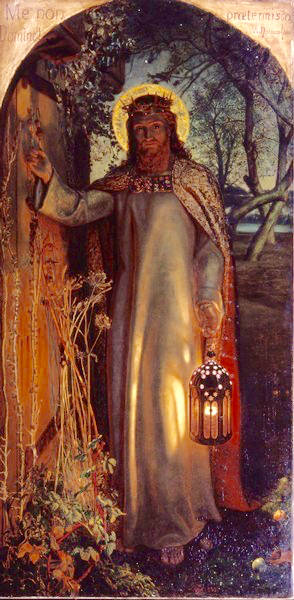
In this post, I explore the role of Christ as light-bearer – one who shines in order to dispel darkness. We consider the need for the church to be more self-critical in response.
Holman Hunt’s famous image, Light of the World, is often interpreted as Christ knocking at the door of an unresponsive human heart — a wooden door overgrown with weeds and with no visible external handle. The metaphor is clear. The image, however, raises pertinent questions regarding both subject and object.
Regarding the subject, Hunt’s portrayal of Christ (as a Westerner) dressed in rich, flowing, almost middle-Eastern kingly robes hints at his divine role as the King of Kings. His messianic role and divine nature are reinforced by a jewelled circlet hinting at a crown of thorns and a head haloed by a rising moon. The dark garden scene is reminiscent of an unoccupied Eden. Instead of tending the garden of the world, the soul is barricaded within its own alternative, self-preoccupied reality. A kind of garden shed.
The first irony, though, is that Christ is also portrayed as self-preoccupied, as if reflecting on the recalcitrance of the rebellious human heart. Christ’s wistful expression hints at a fundamental impotence, almost – an inability to infringe the divine gift of human free will. Christ, in other words, is portrayed as a king whose jurisdiction is curtailed. This image is based on Revelation 3.20, a narrative succeeding a very different image of Christ as a powerful deity before whom, John reports, ‘I fell […] as if I were dead’.

The second irony concerns the object of Christ’s reflective thoughts. The Revelation narrative does not concern an individual human heart, but a church community, that of Laodicea, described using harsh adjectives: this particular church, Christ says, is ‘lukewarm […] wretched and miserable and poor and blind and naked’. It is a church, however, full of self-righteousness and avarice. Christ’s advice is to reject earthly riches, the reliance on earthly, human vision, and the human ‘clothing’ of self-righteousness. He says:
I advise you to buy gold from me—gold that has been purified by fire. Then you will be rich. Also buy white garments from me so you will not be shamed by your nakedness, and ointment for your eyes so you will be able to see (3.18).
Now over the course of these blog posts it will be apparent that I am often critical of the contemporary church, but what I find curious is how many (judging by comments received) see this as being a fundamental sin, almost; that to criticise the church is to criticise an institution ordained and loved by Christ himself. This, I believe, is a more dangerous attitude to take than honest criticism, for when social organisations of any sort cease to be self-critical, they become delusional. An absence of self-criticism is, to phrase it differently, the beginning of fundamentalism – that ‘we know what is right’. The words of Nicholas Lash come to mind here:
Perhaps only a faith that has lost its nerve feels obliged continually to insist that it is quite sure of itself, and knows quite clearly what is to be said concerning the mystery of God.1
As I reflected on this, it occurred to me that those in the New Testament who loved the church most, such the Apostle Paul, were the most critical of her. Most of Paul’s letters to the various churches begin with some diplomatic niceties but before long there is a ‘but’ – often heralding some pretty decisive put-downs and rebukes.
Modern (that is, post-Reformation) Christianity is particularly focused of the eternal destiny of the individual soul, a reflection of the wider societal focus on the individual along with a corresponding loss of the sense of community. But we should not forget that Christ is the head of a community, the church, and that communities are notorious for incubating ideas that lose touch with reality. Unless we become more self-critical (and allow that ‘outsiders’ may have pertinent perspectives) I am afraid that the above words of Christ may be directed at much of our Western church that is so preoccupied with gold, self-righteousness, and human perspectives.
Hunt’s image, then, may be read as a yearning Christ knocking at the door of today’s church. Is it not a worrying thought that such a ‘church’ might exist – that is, that there may be numerous expressions of church that have locked Christ out? I close with a final thought, the subject of my next post.
If communal delusion is part of the issue (the current right-wing Christian view of climate change is a case in point), the solution is not necessarily institutional as such. Of course, if, say, police forces are institutionally racist it is helpful to have senior leaders that highlight the need for change, however, social change is more effective when brought about by individual activism; by grass roots momentum. Our role as individuals is to open the door of our lives to the light of the world. If enough of us choose to do this, and to reject the false gold, vision, and clothing of a corrupted Christianity, Christ will once again shine his light through the church and beyond it.
